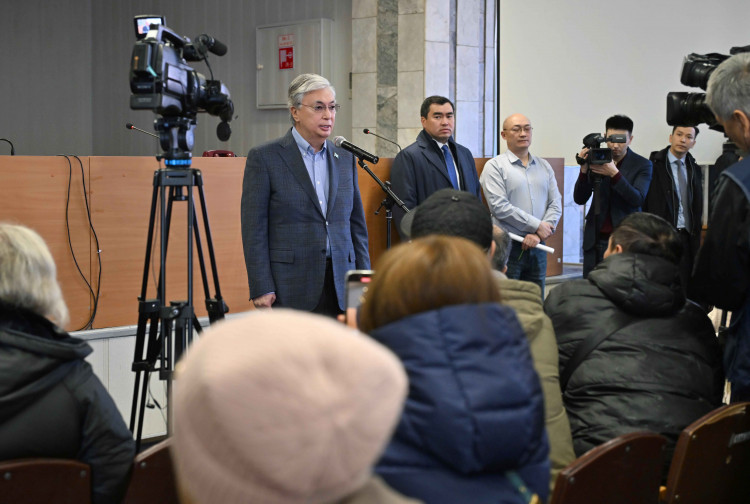
President Tokayev addresses the families of miners in Karaganda. Source: Astana Times
Early on Saturday morning, a fire broke out in the Kosentko coal mine in Karaganda province, Kazakhstan. An underground mine shaft subsequently exploded, likely due to a methane gas leak, leading tens of miners to become trapped seven hundred meters underground (The Qazaqstan Monitor; Kazinform). The next day, President Tokayev arrived in Karaganda to address the survivors of the incident and their families, while also claiming that the government would initiate an investigation into the causes of the disaster. Tokayev declared that the national government would support relatives of those involved in the accident, announcing the creation of a special national fund to do so, and that the search will continue for the remaining eighteen miners still trapped underground (Astana Times). Prime Minister Smailov will investigate the labor practices of ArcelorMittal Temirtau mining company, the operation’s management company and announced that the government has already suspended its investments into the corporation, which President Tokayev called “the worst in our history in terms of cooperation between the government and the enterprise” (Astana Times; Tengri News).
A security conference this week in Belarus granted representatives from Central Asian states the opportunity to articulate their national security positions in relation to one another and the international community. The meeting was called "Eurasian Security: Reality and Prospects in a Transforming World" and featured discussions on the re-articulation of Eurasian security, economic integration and de-nuclearization (Orient). Three hundred attendees from North America, Europe and Central Asia attended the forum, creating a rare cosmopolitan scene in Minsk. Kazakhstan’s Deputy Foreign Minister Roman Vassilenko re-committed his country to its multi-vector international policy. The Minister stated that Kazakhstan will deepen cooperation with international institutions, like the OSCE and in regional organizations like the Chinese-led Shanghai Cooperation Organization, Russia’s Commonwealth of Independent States and Eurasian Economic Union and the United States-led Central Asia+ initiative (Astana Times). Uzbekistan’s representative focused on economic issues, stating that the states in attendance needed to focus on regional efforts to limit inflation and break down economic barriers (UZ Daily).
As Israel has ramped up airstrikes on the Gaza Strip in preparation for a ground invasion of the small Palestinian exclave in the coming month, Central Asia’s leaders have taken varying positions on the escalating conflict. Uzbekistan has taken the strongest stance against what its Ministry of Foreign Affairs called a “terrible act of violence” following an Israeli bombardment of a hospital that Israeli officials claimed was harboring Hamas insurgents (Kun.UZ). Other Central Asian states, namely Kazakhstan and Kyrgyzstan have taken less explicit stances on the conflict. President Tokayev from Kazakhstan called on Israelis to show restraint and comply with international law in their military operations in Gaza (Astana Times). Kyrgyzstan’s Ministry of Foreign Affairs has not released a statement, but supported a United Nations resolution calling for a cessation of fighting in the region (24.kg).
The Turkish and Turkmen leaders met in Ankara to deepen regional cooperation on energy, trade and transit and to enhance the relationship between the two countries. The centerpiece of the Turkish-Turkmen agreement was to increase the transport of oil along the Caspian pipeline to further enrich the two states and deepen their energy cooperation (Orient). The two nations further signed thirteen bilateral agreements of cooperation in fields from culture and youth exchange to the increasing Turkish investment in small and medium industries in Turkmenistan (Orient). These high-level talks preceded a meeting of business interests from both countries, with the goal of furthering people-to-people and economic cooperation between the two states (Turkmenistan Today).
Pakistan has begun to establish holding centers on its border with Afghanistan in preparation for a November 1 deadline when the country will begin deporting the 1.7 million undocumented migrants Pakistani officials claim are living within the country (Afghanistan Times). The United Nations High Commissioner for Human Rights has called on Pakistan to suspend its planned deportations, citing that the move would violate international human rights law, and put the personal safety of groups like women, journalists, human rights advocates and Afghans who worked in the pre-Taliban regime at risk, especially as winter approaches (Afghanistan Times). Officials in the Taliban have further called on Pakistan to halt its mass expulsion of migrants, however, camps are already being set up on the Afghan side of the border to accommodate the expected flow of people re-entering the country (Ariana News).

